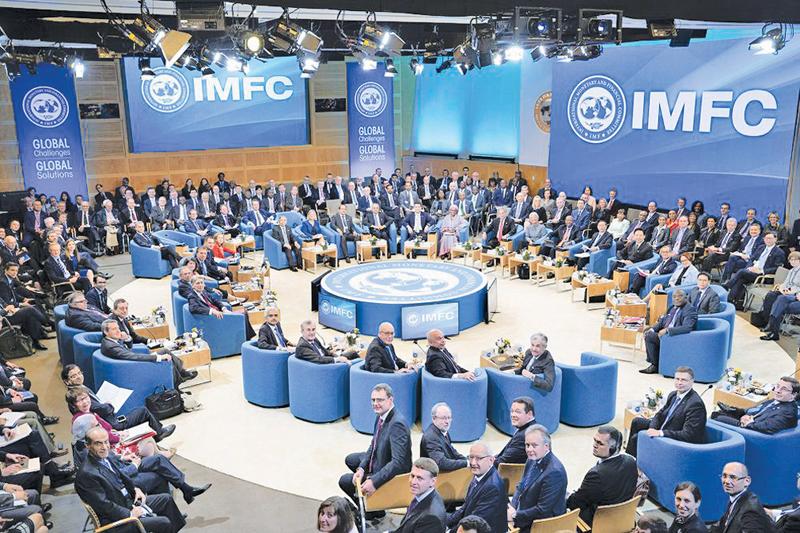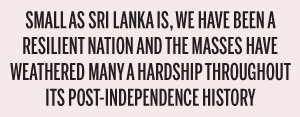
Sri Lanka is $ 35billion in debt. It is a debt that did not happen overnight. It is a debt that the IMF will not solve and cannot solve. Taking loans without a plan and internal measures to curb and cut expenses is not going to help or solve Sri Lanka’s debt situation.
Taking loans and burdening the middle class and poor is unforgiveable while offering tax holidays and incentives to the rich and privatising the little state owned enterprises we have left.
It is a valid question to pose whether the economic collapse and financial fall-outs are pre-planned with geopolitical advice simply to privatise what little we have left and place Sri Lanka under a defacto foreign rule though politicians wish to enjoy all perks of office at the cost of the tax-payer in spite of sacrificing the sovereignty of the nation, a pledge they promise not to do.
It is puzzling how even those we deem ‘intellectuals’ amongst us are chirping the need to accept IMF loans without even looking at the background and eventual outcomes of these loans.
One has to wonder if some of the well-planned protests are simply to justify the Government’s decision to return to IMF claiming it to be what the people want.
Do people realise the repercussions awaiting them after taking IMF loans?
Sri Lanka is in USD 35billion debt – how far will the USD 500m IMF loan provide relief and to whom and at what cost to the people? How many of those demanding Sri Lanka run to the IMF can answer this or are they happy to enjoy some artificial relief with the country flooded with more luxury goods?
 Who were the advisors that allowed the import of US$ 300m worth of luxury goods like mineral water when that money could have been used to import oil knowing the global oil situation? Who will take accountability for this bad decision? Tourists must have been enjoying mineral water in candle-light.
Who were the advisors that allowed the import of US$ 300m worth of luxury goods like mineral water when that money could have been used to import oil knowing the global oil situation? Who will take accountability for this bad decision? Tourists must have been enjoying mineral water in candle-light.
Sri Lanka should not take sides in Indo-Sino rivalries and should not unite with QUAD against China
Sri Lanka has historical relationships with both India and China.
These are special for different reasons. Although the manner of these relationships differ, at all times we must be able to balance ties being careful with the manner we deal with each country in particular taking stock of their past overtures to Sri Lanka.
In that sense we do not have many good memories of India given its role in terrorism in Sri Lanka as well as the political bullying by India and arm-twisting demands made by India over the years.
Cultural implications
All these require Sri Lanka’s political leadership to deal with India with caution in particular regarding the demands they make which have political/economic/social and even cultural implications for Sri Lanka.
How can Sri Lanka agree to cut ties with China simply because India or West demands it? Why should Sri Lanka cut ties with China when India and the West deal with China far more than Sri Lanka?
Why should Sri Lanka give anything to India simply because we have given China? This was the logic used to give Colombo West Terminal without calling for tenders.
Why did Sri Lanka refuse Chinese investments amounting to US$ 3b including an energy plant worth US$1.5b that would have answered the current crisis, simply to please India?
Is India purposely demanding Sri Lanka cut off China so as to put Sri Lanka in a standstill so the QUAD could get their way? Is the refusal of 1million Chinese vaccines simply to bring Pfizer – also part of the Quads anti-China program?
India demands
Whatever India demands – don’t Sri Lanka’s leaders have a spine to diplomatically do what Mrs. B did when India demanded she not allow Pakistan to re-fuel during the Indo-Pak war? If she did not give into Indian demands, why cannot the present political leadership?
Stringent exclusivities
How many are aware of the stringent exclusivities attached to the loans to be given by India? Simply to provide relief for a Government by giving US$1b loan what does Sri Lanka have to forfeit. We have to give India exclusive access to investments that they demand for Indian companies in Sri Lanka.
While it is noteworthy that we owe China only US$8b out of the $35b debt, simply to please India or under Indian orders we have even refused a US$2b swap from China which eventually went to several African countries and Iran got US$500b.
Can Sri Lanka’s leadership and policymakers explain why we are trotting to India to seek US$500m refusing others and likely to agree to giving the Indian Navy access to our waters and giving preference for Indian investments?
What is the catch? Why are we sacrificing our sovereignty to allow Indian troops into our waters? This is no different to US Pacific Command coming and leaving Sri Lanka as they liked during the last Government. Does this also mean that India will agree to US entering Sri Lanka to implement the MCC under another name which will first be vetted by India so as to ensure India’s national security does not get compromised? India is in for future surprises if India thinks US will not eye it eventually to be balkanised.
It should be clear that taking loans or privatising state entities simply to get a bulk amount has not reduced our loans or provided any relief to the masses though it has upped the lives of a handful doing the deals and enjoying the commissions. A country is not for only a handful alone to enjoy.
With essential goods increasing daily and little or no price controls and blackmarket racketeers having a field day, the Government can resort to printing money and paying public servant salaries but how can local companies especially SMEs sustain their companies to make enough revenues to meet the monthly expenses when these are spiraling? These companies and employees are equally helpless. The scenario is no different globally too.
Small as Sri Lanka is, we have been a resilient nation and the masses have weathered many a hardship throughout its post-independence history.
The people have never complained or fussed but have always looked forward to better leadership. But they have been disappointed throughout. All that they have asked and expected for the luxuries that politicians enjoy (applicable to entire Parliament and all political parties) is to protect the sovereignty and territorial integrity of Sri Lanka and the future of the present and future generations.
It is not too much to ask of politicians who indulge in colossal waste. But count the national assets Sri Lanka had at post-independence and count how much we have left and how these remaining assets are also being lined up to be siphoned off. This is unacceptable as it is not a solution and it is only going to leave beggars out of our people.
If politicians deem it fit to sell the country to foreign hands and corporates – there is little point in having a Parliament, politicians or Government – we may as well be under foreign hands! This is certainly not what we want and not what we expect politicians to do.
We hope Parliament realises the debacle taking place as a result of their collective faults and set things right without sacrificing the nation and its people any more than they have.
****
Same medicine
“The IMF has prescribed the same medicine for troubled third world economies for over two decades:
Monetary austerity. Tighten up the money supply to increase internal interest rates to whatever heights needed to stabilise the value of the local currency.
Fiscal austerity. Increase tax collections and reduce Government spending dramatically.
Privatisation. Sell public enterprises to the private sector.
Financial Liberalisation. Remove restrictions on the inflow and outflow of international capital as well as restrictions on what foreign businesses and banks are allowed to buy, own, and operate. Only when Governments sign this “structural adjustment agreement” does the IMF agree to:
Lend enough itself to prevent default on international loans that are about to come due and otherwise would be unpayable.
Arrange a restructuring of the country’s debt among private international lenders that includes a pledge of new loans.”
- Robin Hanhel, Panic Rules! (south End Press, 1999) p.52
****
Human disaster
“Half a world away (from Zambia) in Washington, the architects of this human disaster dine in comfort and seclusion, spending more on one meal than Masauso Phiri’s wife makes in a year of selling buns in their shantytown. Although most World Bank staff work at its Washington headquarters, those unlucky enough to be posted in the Third World receive ample compensation for their misfortune.
This includes subsidised housing (complete with free furnishings), an extended “assignment grant” of US$25,000 and a “mobility premium” to defray the cost of child education.
Salaries are tax-free and averaged $ 86,000 in 1995, according to a General Accounting Office report to Congress. No “structural adjustment”, then, for this privileged coterie of bankers and policy analysts.
Meanwhile, in Africa a hidden genocide lays waste the continent.
“It’s not right for a bank to run the whole world,” says Fred M’membe, editor of the Zambia Post. “They do not represent anybody other than the countries that control them. What this means in practice is that the United States runs our countries.” He continues.
- Mark Lynas, Letter from Zambia, The Nation, February 14, 2000
****
Dirty industries
“Just between you and me, shouldn’t the World Bank be encouraging more migration of dirty industries to the LDCs (less developed countries)?
The economic logic behind dumping a load of toxic waste in the lowest wage country is impeccable, and we should face up to that.
Under-populated countries in Africa are vastly under-polluted; their air quality is probably vastly inefficiently low compared to Los Angeles or Mexico City.
The concern over an agent that causes a one in a million change in the odds of prostate cancer is obviously going to be much higher in a country where people survive to get prostate cancer than in a country where under-five mortality is 200 per thousand.
Lawrence Summers, Let them eat pollution, The Economist, February 8, 1992. Quoted from Vandana Shiva, Stolen Harvest, (South End Press, 2000) p.65; See also Richard Robbins, Global Problems and the Culture of Capitalism (Allyn and Bacon, 1999), pp.233-236 for a detailed look at this.
